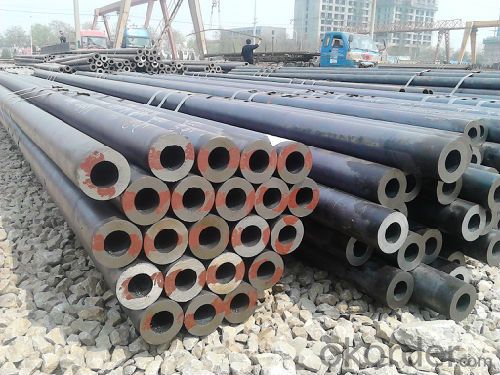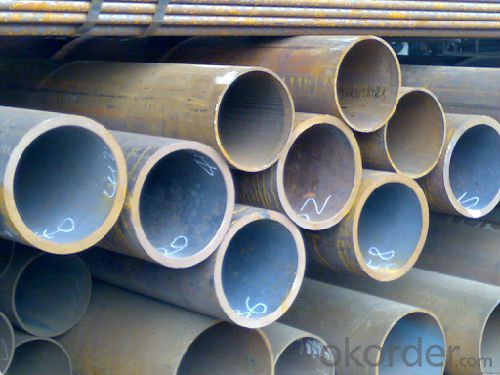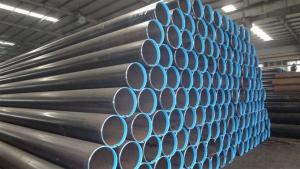API 5L/ASTM A53 ERW Steel Pipe with Best Quality
- Loading Port:
- Tianjin
- Payment Terms:
- TT or LC
- Min Order Qty:
- 20 m.t.
- Supply Capability:
- 15000 m.t./month
OKorder Service Pledge
OKorder Financial Service
You Might Also Like
1、Structure of API 5L/ASTM A53 ERW Steel Pipe with Best Quality:
ERW steel pipe is electric resistance welding, the abbreviation for ERW for transporting oil and natural gas vapor liquid objects, can meet the requirements of high and low pressure, the transport in the world with pipe sector accounted for a pivotal position.
2、Main Features of API 5L/ASTM A53 ERW Steel Pipe with Best Quality:
• High manufacturing accuracy
• High strength
• Good visual effect
• Reasonable price
• Small inertia resistance
• Strong heat dissipation ability
3、API 5L/ASTM A53 ERW Steel Pipe with Best Quality Specification:
Standard | GB, DIN, ASTM ASTM A106-2006, ASTM A53-2007 |
Grade | 10#-45#, 16Mn 10#, 20#, 45#, 16Mn |
Thickness | 1 - 33 mm |
Section Shape | Round |
Outer Diameter | 21 - 610mm |
Place of Origin | Tianjin, China (Mainland) |
Secondary Or Not | Non-secondary |
Application | Hydraulic Pipe |
Technique | Cold Drawn |
Certification | API |
Surface Treatment | factory state or painted black |
Special Pipe | API Pipe |
Alloy Or Not | Non-alloy |
Length | 5-12M |
Outer Diameter | 21.3-610mm |
Grade | 20#, 45#, Q345, API J55, API K55, API L80, API N80, API P110, A53B |
Standard | ASME, ASTM |
1) Material:20#(ASTM A 106/A53 GRB.API5LGRB,GB),45#,16Mn,10#.
2) Specification range:OD:21.3-610mm,WT:6-70mm,length:6-12m or according to the requirement of clients.
3) Excutive standards:GB,ASME API5L.ASTM A 106/A53,Despite of the above standards,we can also supply seamless steel pipe with standard of DIN,JIS,and so on,and also develop new products according to the requirements of our clients!
4) Surface:black lacquered,varnish coating or galvanized.
5) Ends:Beveled or square cut,plastic capped,painted.
6) Packing:bundles wrapped with strong steel strip,seaworthy packing.
4、Packaging & Delivery
Packaging Details: | seaworthy package,bundles wrapped with strong steel strip |
Delivery Detail: | 15-30days after received 30%TT |
5、FAQ of API 5L/ASTM A53 ERW Steel Pipe with Best Quality:
①How is the quality of your products?
Our products are manufactured strictly according to national and internaional standard, and we take a test
on every pipe before delivered out. If you want see our quality certifications and all kinds of testing report, please just ask us for it.
Guaranteed: If products’ quality don’t accord to discription as we give or the promise before you place order, we promise 100% refund.
②How about price?
Yes, we are factory and be able to give you lowest price below market one, and we have a policy that “ for saving time and absolutely honest business attitude, we quote as lowest as possible for any customer, and discount can be given according to quantity”,if you like bargain and factory price is not low enough as you think, just don’t waste your time.Please trust the quotation we would give you, it is professional one.
③Why should you chose us?
Chose happens because of quality, then price, We can give you both.Additionally, we can also offer professional products inquiry, products knowledge train(for agents), smooth goods delivery, exellent customer solution proposals.Our service formula: good quality+good price+good service=customer’s trust
SGS test is available, customer inspection before shipping is welcome, third party inspection is no problem.


- Q:Are steel pipes suitable for underground cable protection?
- Yes, steel pipes are suitable for underground cable protection. Steel pipes provide excellent durability and strength, making them ideal for protecting cables from external factors such as physical damage, moisture, and corrosion. They are able to withstand the weight of the soil and any potential pressure from above, ensuring the cables remain secure and protected. Additionally, steel pipes can be easily welded or connected to create a continuous and seamless conduit, further enhancing their effectiveness in underground cable protection.
- Q:What are the different pressure ratings for steel pipes?
- Steel pipes have varying pressure ratings to indicate their maximum safe handling pressure. The pressure ratings of steel pipes can differ based on factors like pipe diameter, wall thickness, and material grade. Common pressure ratings for steel pipes are as follows: 1. Schedule 40: This is the standard pressure rating for general applications. It is suitable for low to medium pressure systems, with a maximum working pressure of 150 psi. 2. Schedule 80: Used for higher pressure requirements, it has a thicker wall thickness compared to Schedule 40, enabling it to handle working pressures of up to 300 psi. 3. Schedule 160: This heavy-duty pressure rating is for high-pressure applications. It has an even thicker wall thickness than Schedule 80 and can handle working pressures of up to 500 psi. In addition to these standard pressure ratings, there are specialized steel pipes available with higher pressure ratings, such as Extra Strong (XS) and Double Extra Strong (XXS). These pipes are designed for extremely high-pressure systems and have thicker walls than Schedule 160. It's important to note that the pressure ratings mentioned above specifically apply to steel pipes. Pressure ratings may vary for pipes made from other materials, such as copper or PVC. When selecting a steel pipe, it is crucial to consider the required pressure rating based on the specific application and system requirements to ensure safe and efficient operation.
- Q:What are the different types of gaskets used with steel pipes?
- There are several types of gaskets used with steel pipes, including spiral wound gaskets, ring joint gaskets, and non-metallic gaskets. These gaskets are used to create a tight seal between pipe flanges, preventing leakage of fluids or gases.
- Q:What is the role of steel pipes in the transportation of petroleum products?
- Steel pipes play a crucial role in the transportation of petroleum products as they provide a safe and efficient means of transferring oil and gas over long distances. These pipes are strong, durable, and resistant to corrosion, ensuring the integrity of the pipelines and preventing leakage or contamination of the products. Additionally, steel pipes have high heat resistance, making them suitable for transporting hot petroleum products. Overall, steel pipes serve as the backbone of the petroleum transportation infrastructure, facilitating the smooth and reliable delivery of these essential energy resources.
- Q:What are the specific differences between flexible pipes and rigid pipes?
- Structurally:A rigid waterproof sleeve is welded with a water stop ring outside the steel pipe;The flexible waterproof casing pipe is welded on the outside of the 3 side wing ring, 4 screw buckle, inside a welding piece with a rubber ring, the outside and do a flange, with 4 double head bolt, welding a steel pipe, the pipe installed, the flange is installed. The screw fastening, tightening the apron is bigger, more Water Leakage, generally in the waterproof requirements of relatively high places, such as the pool of water.
- Q:How are steel pipes repaired in case of damage?
- Steel pipes are typically repaired by first identifying the damaged section of the pipe. Then, the damaged area is cut out and replaced with a new section of pipe. This new section is welded or clamped into place to ensure a secure connection. In some cases, epoxy or other sealants may be used to repair smaller cracks or leaks. Overall, the repair process aims to restore the structural integrity and functionality of the steel pipes.
- Q:What is the difference between steel pipes and PVC-M pipes?
- Steel pipes are made of a strong and durable metal, while PVC-M pipes are made of a thermoplastic material known as polyvinyl chloride modified. The main difference lies in their composition and characteristics. Steel pipes are typically heavier and more robust, offering greater strength and resistance to high pressure and temperature. On the other hand, PVC-M pipes are lightweight, flexible, and corrosion-resistant, making them ideal for applications where chemical resistance and ease of installation are crucial factors.
- Q:How are steel pipes used in the construction of power transmission lines?
- Steel pipes are commonly used in the construction of power transmission lines due to their exceptional strength, durability, and versatility. These pipes serve various purposes throughout the project, contributing to the overall efficiency and reliability of the power transmission system. One primary application of steel pipes in power transmission line construction is for the installation of transmission towers. These pipes are used as structural components to support the transmission lines and maintain their alignment. The high strength of steel ensures that the towers can withstand the weight of the transmission lines, as well as external forces such as wind and ice loads. Moreover, steel pipes offer excellent resistance against corrosion, which is crucial for the longevity of the transmission tower structures. In addition to tower construction, steel pipes are also utilized for the underground transmission lines. These pipes act as conduits for the cables, protecting them from external elements and potential damage. Steel pipes are particularly advantageous in this application due to their ability to resist soil movement, withstand high pressure, and provide a secure pathway for the power cables. Furthermore, the durability of steel ensures the integrity and longevity of the underground transmission lines, reducing maintenance requirements and enhancing the overall reliability of the power transmission system. Furthermore, steel pipes are used for the construction of foundations and anchors for transmission towers. These pipes are driven deep into the ground to provide stability and support to the towers. The inherent strength and rigidity of steel pipes make them ideal for this purpose, as they can withstand the heavy loads and ensure the stability of the transmission towers even in adverse weather conditions. Overall, steel pipes play a crucial role in the construction of power transmission lines by providing structural support, protecting cables, and ensuring the overall reliability and efficiency of the transmission system. Their exceptional strength, durability, and resistance to corrosion make steel pipes an ideal choice for power transmission line construction projects.
- Q:How are steel pipes used in the marine industry?
- Steel pipes are commonly used in the marine industry for various applications such as transportation of fluids, structural support, and offshore drilling. They are used for the construction of ships, offshore platforms, and pipelines, as they possess high durability, strength, and corrosion resistance. Additionally, steel pipes are used for cooling systems, ballast transfer, and other critical functions required in marine engineering.
- Q:What are the standard specifications for steel pipes?
- The standard specifications for steel pipes vary depending on the intended use and industry requirements. However, some common standard specifications include the pipe's size, wall thickness, material composition (such as carbon steel or stainless steel), and pressure ratings. Other specifications may include the pipe's shape, length, and surface finish. It is essential to consult relevant standards organizations, such as ASTM or ASME, to determine the specific standard specifications for steel pipes in a given application.
1. Manufacturer Overview |
|
|---|---|
| Location | |
| Year Established | |
| Annual Output Value | |
| Main Markets | |
| Company Certifications | |
2. Manufacturer Certificates |
|
|---|---|
| a) Certification Name | |
| Range | |
| Reference | |
| Validity Period | |
3. Manufacturer Capability |
|
|---|---|
| a)Trade Capacity | |
| Nearest Port | |
| Export Percentage | |
| No.of Employees in Trade Department | |
| Language Spoken: | |
| b)Factory Information | |
| Factory Size: | |
| No. of Production Lines | |
| Contract Manufacturing | |
| Product Price Range | |
Send your message to us
API 5L/ASTM A53 ERW Steel Pipe with Best Quality
- Loading Port:
- Tianjin
- Payment Terms:
- TT or LC
- Min Order Qty:
- 20 m.t.
- Supply Capability:
- 15000 m.t./month
OKorder Service Pledge
OKorder Financial Service
Similar products
New products
Hot products
Related keywords





























